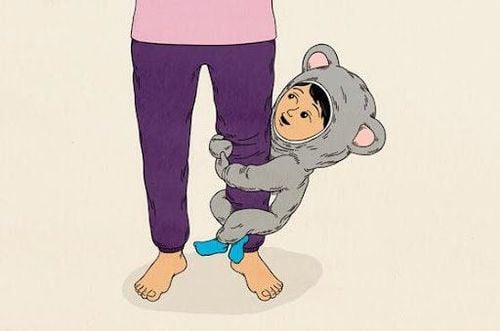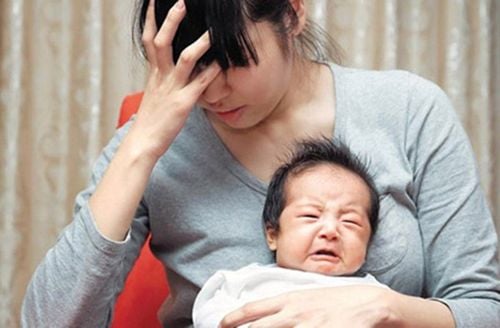This is an automatically translated article.
Soon-to-be parents, experienced parents, and even those who are thinking about having children are dominated by the idea that the maternal instinct is something all women possess. So, what is the maternal instinct, and why has the concept persisted for so long?
1. What is the maternal instinct?
Talking about this, Dr. Catherine Monk, psychologist and professor of medical psychology in the department of psychiatry and obstetrics and gynecology at Columbia, said: “The word instinct refers to something innate - involved in fixed behavioral responses in the context of certain stimuli.
Based on that definition, Monk says that the idea of maternal instinct implies that there is an innate knowledge and set of caring behaviors that are an automatic part of being a mother.
But in reality, the idea of maternal instincts may have been exaggerated beyond reality. History has given us the belief that the maternal instinct is what drives us to want children and then to know exactly what to do when we have a baby.
However, Monk suggests that as a mother or anyone raising an infant or young child, learning on the job, through guidance, good examples and observing what works and not being appropriate for each child is the most important thing.
This “learning on the job” happens from the moment a child is born. This is the time when many people assume that the maternal instinct will kick in and lead to an instant feeling of love.
But instead, according to a 2018 study, these cuddling feelings develop a few days after giving birth, with some women even taking months to feel them.
When these cuddling feelings don't happen immediately or take a long time to develop, many moms experience a sense of failure. You may feel this is a sign you have no maternal instincts. In fact, they just need support and help to develop more realistic child-rearing skills.
2. Is the maternal instinct a myth?
According to Dr. Monk, the idea of maternal instinct is largely a myth. The exception, she said, is that a person, regardless of their gender or sexual orientation, is able to gain early and sustain throughout the development of a keen sense of their child. But this ability is still different from a mother's instinct.
For example, a mother or father can quickly tell the specific meaning behind the cry of a newborn baby. They can also easily recognize behavioral changes that signal changes in toddlers. This continues as the child gets older, when parents may find it difficult to be in a minor's room when it's too quiet.
Dr Monk says: “'A woman's motherly instinct or sixth sense for a child and what they need comes from intense closeness and deep love, they give time and think about the child. It involves seeing signs because of the bond the mother has built with the child, rather than an instinctive understanding of motherhood. And it's not limited to moms.
Psychotherapist Dana Dorfman agrees that many aspects of the maternal instinct are a myth. "A mother's intuition or innate sense of her baby's needs can be attributed to their experience, temperament and attachment style," says Dr. Dorfman.
Many aspects of caring for a child are learned through observation or “on the job” experience. “Breastfeeding, changing diapers, and feeding babies are not necessarily biologically innate abilities for a woman,” Dorfman points out.
Dorfman says that when parents connect and bond with their children, they learn parenting skills through practice and experience. While some of this process may be "unconscious," it doesn't necessarily mean it's instinctive.

Bản năng của người mẹ gắn liền với quá trình chăm sóc và phát triển của trẻ
Dr Dorfman says: “When you become a parent, biologically or otherwise, your brain chemistry changes. This doesn't just happen to people who give birth.” In fact, research shows that adoptive fathers and parents also experience elevated levels of oxytocin, serotonin, and dopamine during the transition to parenthood. This variation in birth parents and in adoptive parents comes from bonding activities between caregivers and babies.
Another study found that men and women were equally skilled at identifying infant cries. This supports the idea that maternal instinct is a myth.
The researchers who carried out this study determined that the amount of time parents spend with their baby is directly correlated with being able to determine what a baby's cry means, not gender. of parents.
3. What is the difference between instinct and motivation?
To see where the term maternal instinct comes from, we must first understand the difference between instinct and motivation, because they are definitely not the same thing.
Dr. Gabriela Martorell, a professor of psychology from Virginia Wesleyan University, said: “In psychology, physiological motivation is a state of motivation derived from physiological need, and the need is the basis of it. for that motivation”.
On the other hand, according to Martorell instinct is an innate or unintentional response to a signal. Instinct is found in all members of a species and is the product of evolutionary pressures that shape behavior over time. In other words, instinctive motivations are behaviors.
Martorell says that most humans do not have instincts like most other animals. That's because most instincts are rigid, unchanging, and stimulated by a simple stimulus, while humans are flexible and adaptable.
Dr. Martorell says: “We can go hungry, but instead of having a fixed behavior like animals, we can choose to open the refrigerator or walk to a nearby coffee shop or go to the grocery store to buy food.” Although most of our behaviors are strongly influenced by evolution, they are both learnable and changeable.
According to Dr. Martorell, with regard to motherhood, the processes that shape our behavior in this area are old and profound, but it would be incorrect to call most of them instinct.
In addition, she also explains that many actions can be better described as parenting behavior than mothering behavior, since both parents are biologically prepared to enter close relationship with children.
From an evolutionary point of view, Dorfman explains that humans have a reproductive organ system with many changes that take place in order to have children. “A woman’s body goes through many hormonal changes during pregnancy, and the release of such hormones impacts behaviour, cognition and emotions,” she says. Shifts in the hormones estrogen and the release of oxytocin (“the love hormone”) encourage bonding, attachment, and attraction.

Bản năng làm mẹ liên quan đến những hành vi và cảm xúc
However, Dorfman points out, the motivation to become a mother is not always innate, and many healthy women don't experience "motivation to be a mother." Furthermore, Dr Monk explains that many people choose not to have children while still exhibiting their mythical maternal instincts in different ways, such as being a devoted soccer coach with children at their age. go to school or a generous and caring teacher.
That's why she believes we need to change our perspective and move from the "motherly instinct" to the "caring instinct", and then view this behavior as normal. The childcare instinct is not limited to just mothers or even only parents have it.
4. Change your mind, women always have a motherly instinct
The idea that women should instinctively want to have children and know how to take care of them creates a lot of pressure on both society and on themselves. It also reduces a father's or other parent's ability to bond with the children. Both parents are equally capable of parenting behaviors.
Such set expectations put pressure on people, which Dr Monk says can contribute to postpartum depression. For example, some women (and even men) find the newborn period less exciting than they imagined and may feel embarrassed about the feeling. These emotions can contribute to self-blame and lead to depression.
According to Dr. Monk, in order to remove the pressure from thinking that women always have maternal instincts, it is important for mothers and mothers-to-be to remember that raising young children is purely a behavior. learning with significant influences from the past and plenty of opportunities to gain new influences and training in the present. There is no natural way for a person to become a good mother.”
What we think of as a mother's instinct is just a myth, and perpetuating the idea that it is real is making parenting overwhelming for mothers. So let go of those unrealistic expectations. Parenting is a challenge that you learn as you go on with it.
Please dial HOTLINE for more information or register for an appointment HERE. Download MyVinmec app to make appointments faster and to manage your bookings easily.













